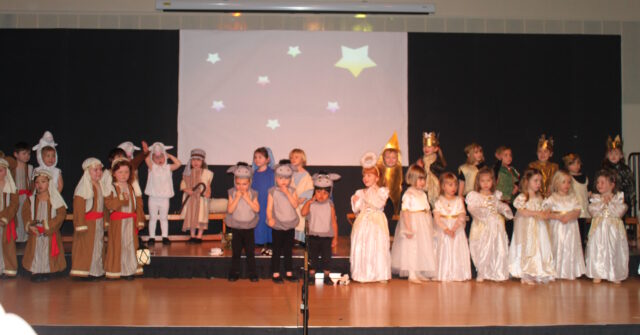Of all the discussions I’ve ever been involved with on the subject of religion, the one I’m proudest of was perhaps also one of the earliest.
Let me tell you about a time that, as an infant, I got sent out of my classroom because I wouldn’t stop questioning the theological ramifications of our school nativity play.
I’m aware that I’ve got readers from around the world, and Christmas traditions vary, so let’s start with a primer. Here in the UK, it’s common1 at the end of the school term before Christmas for primary schools to put on a “nativity play”. A group of infant pupils act out an interpretation of the biblical story of the birth of Jesus: a handful of 5/6-year-olds playing the key parts of, for example, Mary, Joseph, an innkeeper, some angels, maybe a donkey, some wise men, some shepherds, and what-have-you.

As with all theatre performed by young children, a nativity play straddles the line between adorable and unbearable. Somehow, the innkeeper – who only has one line – forgets to say “there is no room at the inn” and so it looks like Mary and Joseph just elect to stay in the barn, one of the angels wets herself in the middle of a chorus, and Mary, bored of sitting in the background having run out of things to do, idly swings the saviour of mankind round and around, holding him by his toe. It’s beautiful2.
I was definitely in a couple of different nativity plays as a young child, but one in particular stands out in my memory.

In order to put a different spin on the story of the first Christmas3, one year my school decided to tell a different, adjacent story. Here’s a summary of the key beats of the plot, as I remember it:
- God is going to send His only son to Earth and wants to advertise His coming.
- “What kind of marker can he put in the sky to lead people to the holy infant’s birthplace?”, He wonders.
- So He auditions a series of different natural phenomena:
- The first candidate is a cloud, but its pitch is rejected because… I don’t remember: it’ll blow away or something.
- Another candidate was a rainbow, but it was clearly derivative of an earlier story, perhaps.
- After a few options, eventually God settles on a star. Hurrah!
- Some angels go put the star in the right place, shepherds and wise men go visit Mary and her family, and all that jazz.
So far, totally on-brand for a primary school nativity play but with 50% more imagination than the average. Nice.

I was cast as Adviser #1, and that’s where things started to go wrong.
The part of God was played by my friend Daniel, but clearly our teacher figured that he wouldn’t be able to remember all of his lines4 and expanded his role into three: God, Adviser #1, and Adviser #2. After each natural phenomenon explained why it would be the best, Adviser #1 and Adviser #2 would each say a few words about the candidate’s pros and cons, providing God with the information He needed to make a decision.
To my young brain, this seemed theologically absurd. Why would God need an adviser?5
“If He’s supposed to be omniscient, why does God need an adviser, let alone two?” I asked my teacher6.
The answer was, of course, that while God might be capable of anything… if the kid playing Him managed to remember all of his lines then that’d really be a miracle. But I’d interrupted rehearsals for my question and my teacher Mrs. Doyle clearly didn’t want to explain that in front of the class.
But I wouldn’t let it go:
- “But Miss, are we saying that God could make mistakes?”
- “Couldn’t God try out the cloud and the rainbow and just go back in time when He knows which one works?”
- “Why does God send an angel to tell the shepherds where to go but won’t do that for the kings?”
- “Miss, don’t the stars move across the sky each night? Wouldn’t everybody be asking questions about the bright one that doesn’t?”
- “Hang on, what’s supposed to have happened to the Star of Bethlehem after God was done with it? Did it have planets? Did those planets… have life?”
In the end I had to be thrown out of class. I spent the rest of that rehearsal standing in the corridor.
And it was totally worth it for this anecdote.
Footnotes
1 I looked around to see if the primary school nativity play was still common, or if the continuing practice at my kids’ school shows that I’m living in a bubble, but the only source I could find was a 2007 news story that claims that nativity plays are “under threat”… by The Telegraph, who I’d expect to write such a story after, I don’t know, the editor’s kids decided to put on a slightly-more-secular play one year. Let’s just continue to say that the school nativity play is common in the UK, because I can’t find any reliable evidence to the contrary.
2 I’ve worked onstage and backstage on a variety of productions, and I have nothing but respect for any teacher who, on top of their regular workload and despite being unjustifiably underpaid, volunteers to put on a nativity play. I genuinely believe that the kids get a huge amount out of it, but man it looks like a monumental amount of work.
3 And, presumably, spare the poor parents who by now had potentially seen children’s amateur dramatics interpretations of the same story several times already.
4 Our teacher was probably correct.
5 In hindsight, my objection to this scripting decision might actually have been masking an objection to the casting decision. I wanted to play God!
6 I might not have used the word “omniscient”, because I probably didn’t know the word yet. But I knew the concept, and I certainly knew that my teacher was on spiritually-shaky ground to claim both that God knew everything and God needed an advisor.



